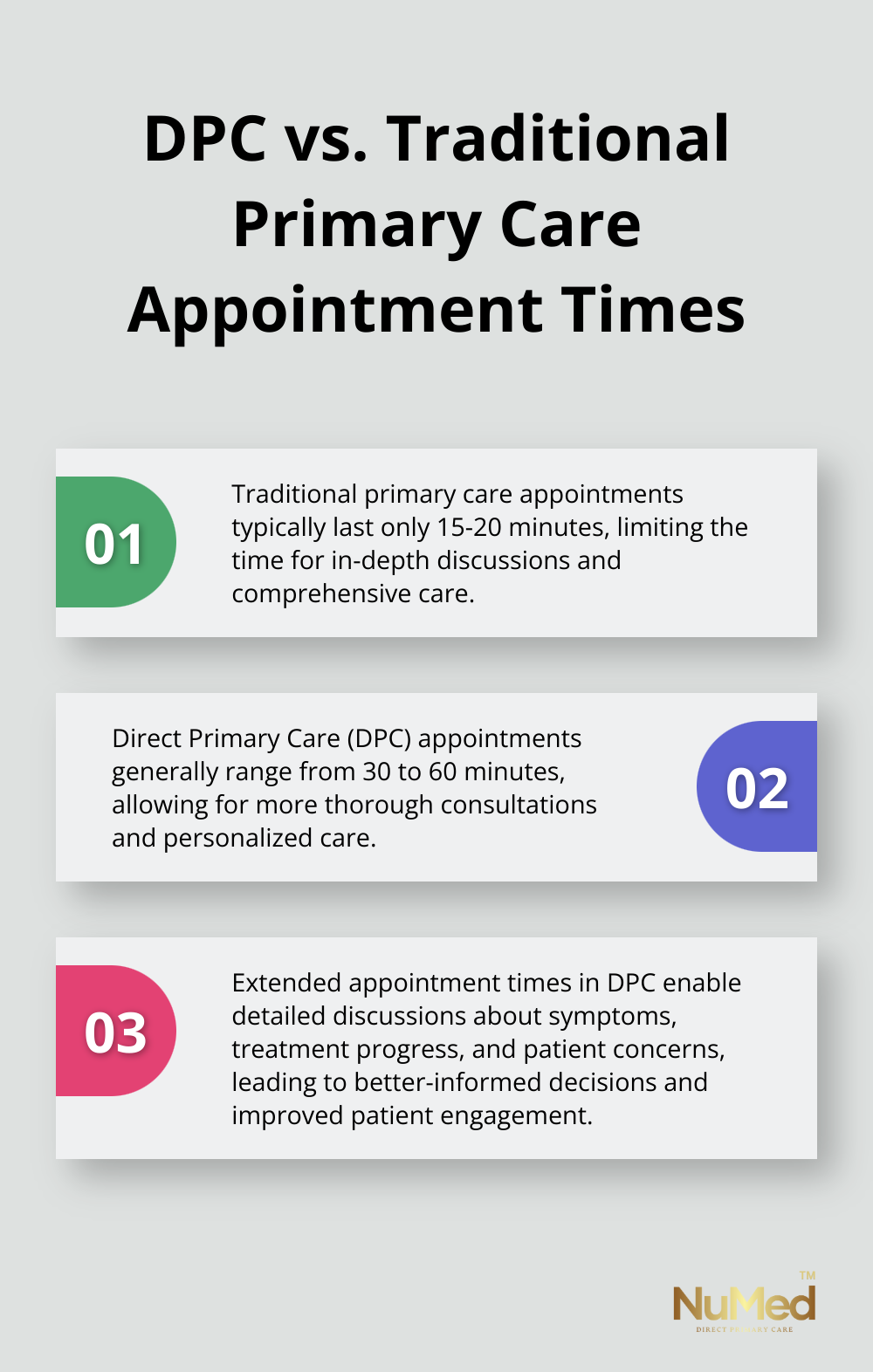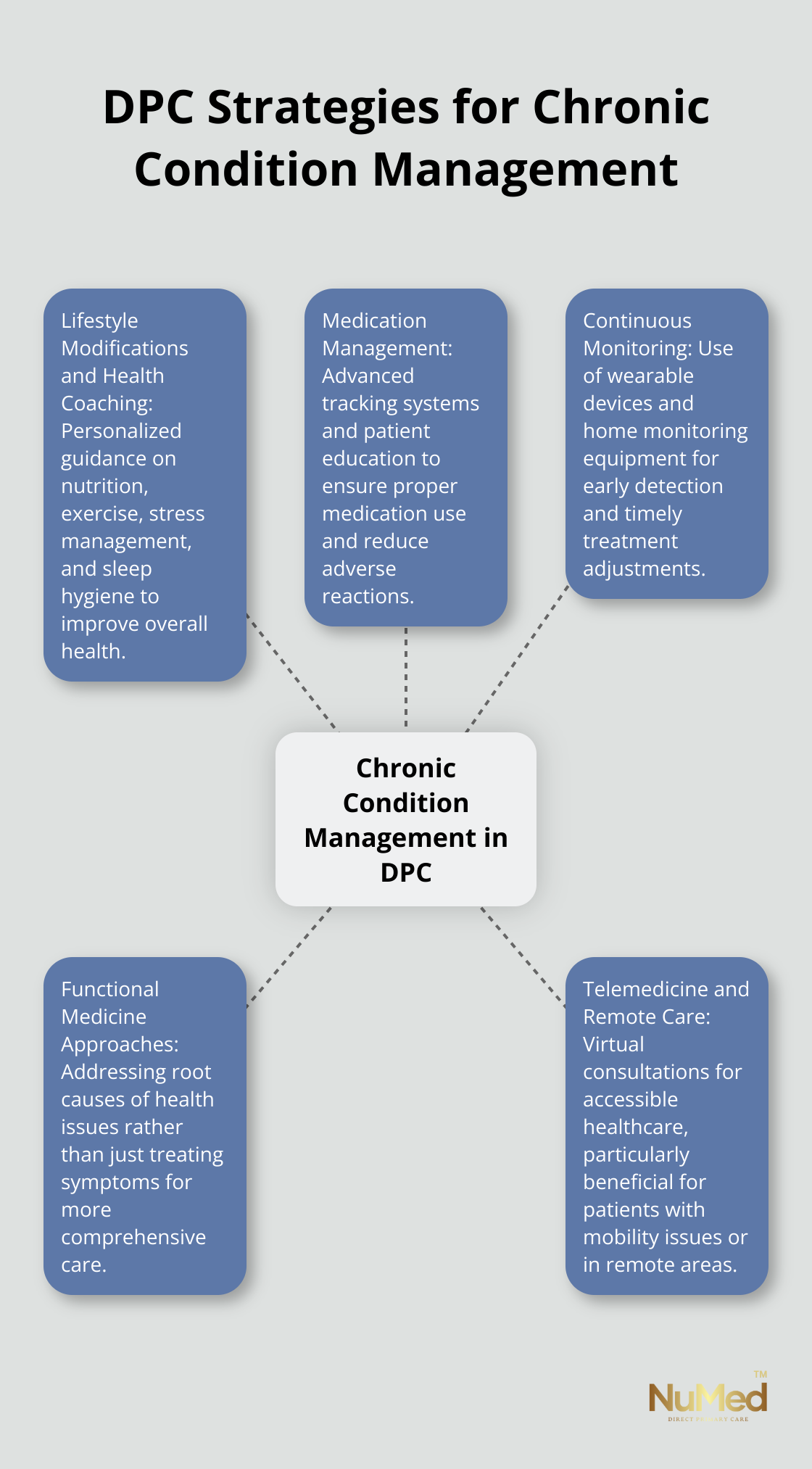Chronic conditions affect millions of Americans, demanding ongoing care and support. At NuMed DPC, we’ve seen firsthand how Direct Primary Care (DPC) can transform chronic management for our patients.
Our approach offers personalized, accessible healthcare that’s particularly beneficial for those dealing with long-term health issues. This blog post explores how DPC empowers patients to take control of their chronic conditions and improve their quality of life.
What Are Chronic Conditions in Direct Primary Care?
Defining Chronic Conditions
Chronic conditions represent long-term health issues that require ongoing management and care. The Centers for Disease Control and Prevention (CDC) reports that six in ten adults in the United States have a chronic disease, and four in ten adults have two or more. These statistics highlight the prevalence and importance of addressing chronic conditions in healthcare settings.

Common Chronic Conditions Managed in DPC
Direct Primary Care (DPC) practices often focus on conditions such as diabetes, hypertension, obesity, and chronic pain. These health issues demand regular monitoring, medication adjustments, and lifestyle modifications. For example, patients with type 2 diabetes benefit from continuous glucose monitoring and personalized nutrition plans (which are often key components of DPC care).
The DPC Advantage for Chronic Care
The DPC model excels in managing chronic conditions due to its emphasis on continuous, personalized care. Unlike traditional healthcare models where patients might see their doctor for just a few minutes every few months, DPC allows for more frequent and in-depth interactions. This approach proves essential for effective chronic condition management.
A systematic review aimed to assess the effectiveness of specialist involvement in primary healthcare teams on glycemic control of patients with diabetes. This type of research contributes to our understanding of how different care models, including DPC, can impact chronic condition management.
Proactive Management and Prevention
DPC takes a proactive approach to chronic condition management. This strategy doesn’t just treat symptoms; it works to prevent complications and improve overall health. For instance, hypertension patients in DPC settings often receive regular blood pressure checks and lifestyle counseling to reduce their risk of heart disease and stroke.
Leveraging Technology for Enhanced Care
Many DPC practices leverage technology to enhance chronic care. Patients often use wearable devices to track their health metrics, which physicians then analyze during consultations. This real-time data allows for timely adjustments to treatment plans and early detection of potential issues.
The continuous care model of DPC addresses the complex, ongoing needs of those living with chronic health issues. As we explore the advantages of DPC for chronic condition management in the next section, we’ll see how this approach translates into tangible benefits for patients.
How DPC Transforms Chronic Condition Management
Direct Primary Care (DPC) revolutionizes the management of chronic conditions. This approach surpasses traditional healthcare models, offering a range of advantages that significantly improve patient outcomes and quality of life.
Tailored Care Plans and Continuous Monitoring
DPC enables the creation of highly personalized care plans. A patient with type 2 diabetes in a DPC practice receives a customized plan that includes regular A1C checks, nutrition counseling, and exercise recommendations. This level of personalization ensures comprehensive addressing of each aspect of the patient’s condition.
The frequency of follow-ups in DPC stands unmatched.
In-Depth Consultations for Better Understanding
One of the most significant advantages of DPC is the extended appointment times. While traditional primary care visits often last only 15-20 minutes, DPC appointments typically range from 30 to 60 minutes. This extra time allows thorough discussions about symptoms, treatment progress, and any concerns the patient may have.

For example, a patient with hypertension at a DPC practice might spend 45 minutes discussing their blood pressure readings, medication side effects, and lifestyle factors affecting their condition. This comprehensive approach leads to better-informed decisions and improved patient engagement in their own health management.
Seamless Access to Healthcare Support
DPC practices excel in providing easy access to healthcare providers. Many DPC clinics offer same-day or next-day appointments, eliminating long wait times that can exacerbate chronic conditions. Additionally, patients often have direct communication channels with their physicians through secure messaging or telemedicine platforms.
DPC allows patients to have a direct relationship with their primary care physician and improved access to their needed services and treatment. This level of accessibility proves particularly crucial for managing chronic conditions, where timely interventions can prevent serious complications.
Financial Benefits of DPC for Chronic Care
The cost-effectiveness of DPC for chronic condition management deserves attention. This reduction in hospitalizations translates to significant cost savings for patients with chronic conditions.
Furthermore, the transparent pricing model of DPC eliminates unexpected costs. Patients with chronic conditions often require frequent visits and tests, which can lead to substantial out-of-pocket expenses in traditional healthcare models. In contrast, DPC’s monthly membership fee covers most primary care services, making healthcare costs more predictable and manageable for those with ongoing health needs.
The patient-centered approach of DPC reshapes how we approach long-term health management. This model not only improves health outcomes but also enhances the overall healthcare experience for patients living with chronic conditions. As we explore strategies for managing chronic conditions in DPC, we’ll uncover how this approach translates into practical, day-to-day care.
Effective Strategies for Chronic Condition Management
At NuMed DPC, we have developed a comprehensive approach to managing chronic conditions that surpasses traditional healthcare models. Our strategies focus on patient empowerment through personalized care plans, advanced technology, and continuous support.

Lifestyle Modifications and Health Coaching
Lifestyle modification serves as a powerful tool in managing chronic conditions. We collaborate closely with our patients to pinpoint areas where changes can yield the most significant impact. Patients with type 2 diabetes often experience notable improvements in their blood sugar levels through dietary adjustments and increased physical activity.
Our health coaches provide invaluable support in this process. They offer personalized guidance on nutrition, exercise, stress management, and sleep hygiene. A recent review of lifestyle interventions for type 2 diabetes and prediabetes has highlighted the pragmatic implications of such approaches in treatment and potential remission of these conditions.
Medication Management and Adherence Support
Proper medication management plays a vital role in controlling chronic conditions. Advanced medication tracking systems help ensure patients take the right medications at the right times. This technology has improved medication adherence rates among patients with hypertension.
We prioritize patient education about medications. Our doctors allocate time to explain the purpose of each medication, potential side effects, and correct usage. This approach has reduced adverse drug reactions among chronic condition patients.
Continuous Monitoring and Treatment Adjustments
Regular monitoring allows us to stay ahead of chronic conditions. We employ wearable devices and home monitoring equipment to track vital health metrics continuously. Patients with heart conditions use smartwatches that monitor heart rate and rhythm, enabling early detection of potential issues.
Our healthcare team reviews this data regularly, allowing for timely adjustments to treatment plans. This proactive approach has reduced hospital admissions for patients with chronic heart failure.
Integration of Functional Medicine Approaches
We incorporate functional medicine principles into our chronic condition management strategies. This approach addresses the root causes of health issues rather than just treating symptoms. For example, we might explore gut health and inflammation in patients with autoimmune conditions, leading to more comprehensive treatment plans.
Telemedicine and Remote Care
Telemedicine plays a significant role in our chronic condition management strategy. We offer virtual consultations, allowing patients to discuss their health concerns from the comfort of their homes. This accessibility proves particularly beneficial for patients with mobility issues or those living in remote areas.
Final Thoughts
Direct Primary Care (DPC) revolutionizes chronic management, offering personalized care plans and extended appointments that address complex health needs. Patients receive continuous support, which improves their ability to manage long-term conditions effectively. The DPC model eliminates many barriers present in traditional healthcare systems, empowering individuals to take control of their health with dedicated professional support.
The impact of DPC on patient health and quality of life extends far beyond symptom management. It focuses on preventive care, lifestyle modifications, and proactive monitoring to help patients avoid complications and enhance overall well-being. Strong doctor-patient relationships foster better communication, increased trust, and more effective treatment strategies, leading to improved health outcomes and patient engagement.
We at NuMed Direct Primary Care have observed the positive effects of this approach on our patients’ lives (particularly in chronic condition management). Our commitment to holistic healthcare and prevention-focused strategies has helped numerous individuals improve their health. If you seek a comprehensive and empowering healthcare experience, explore the benefits of DPC for your chronic condition management needs.
















